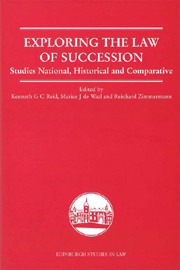Book contents
- Frontmatter
- Contents
- Preface
- List of Contributors
- List of Abbreviations
- Table of Cases
- 1 A Comparative Overview
- 2 Compulsory Heirship in Roman Law
- 3 Succession Law in Scotland – a Historical Perspective
- 4 Succession Law in South Africa – a Historical Perspective
- 5 Freedom of Testation and the Ageing Testator
- 6 Testamentary Conditions and Public Policy
- 7 Forfeiture Clauses and Events in Scots Law
- 8 Revocation of Wills by Changed Circumstances
- 9 Fideicommissary Substitutions: Scots Law in Historical and Comparative Perspective
- 10 The conditio si institutus sine liberis decesserit in Scots and South African Law
- 11 The New Dutch Law of Succession
- 12 Revocability of Mutual Wills
- 13 Succession Agreements in South African and Scots Law
- Index
Preface
Published online by Cambridge University Press: 12 September 2012
- Frontmatter
- Contents
- Preface
- List of Contributors
- List of Abbreviations
- Table of Cases
- 1 A Comparative Overview
- 2 Compulsory Heirship in Roman Law
- 3 Succession Law in Scotland – a Historical Perspective
- 4 Succession Law in South Africa – a Historical Perspective
- 5 Freedom of Testation and the Ageing Testator
- 6 Testamentary Conditions and Public Policy
- 7 Forfeiture Clauses and Events in Scots Law
- 8 Revocation of Wills by Changed Circumstances
- 9 Fideicommissary Substitutions: Scots Law in Historical and Comparative Perspective
- 10 The conditio si institutus sine liberis decesserit in Scots and South African Law
- 11 The New Dutch Law of Succession
- 12 Revocability of Mutual Wills
- 13 Succession Agreements in South African and Scots Law
- Index
Summary
By comparison with other areas of private law, the law of succession has fallen into neglect. Academic literature is surprisingly sparse even in relation to national systems of law, while such comparative treatments as exist are often little more than country-by-country summaries. Yet succession law is on the move. Some causes are discussed in the first chapter of this volume. The relationship between family law and the law of succession has become more apparent and better understood, and the impact on the latter of changes in the former can be seen, for example, in the shift of focus from the “nuclear” family to a more inclusive concept which extends to partners outside of formal marriage. In another important development, human rights instruments have led to restrictions on freedom of testation, to the removal of succession rules which discriminate against, for instance, the extra-marital child, and to a reconsideration of aspects of customary succession systems. Above all, social and economic change has had, and will continue to have, a marked influence on the law's development. As these trends are not confined to any one country, they present a challenge to the view, hitherto widely held, that succession law is a matter of local concern and local practice, and that little is to be gained from comparative research. One result has been a new interest in the possibility of harmonisation of succession law, especially in the European context. Another has been to open out the vista for more focused comparative research.
- Type
- Chapter
- Information
- Exploring the Law of SuccessionStudies National Historical and Comparative, pp. vii - viiiPublisher: Edinburgh University PressPrint publication year: 2007



